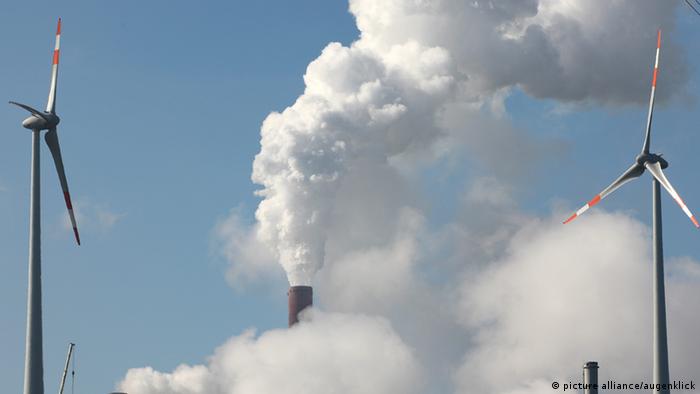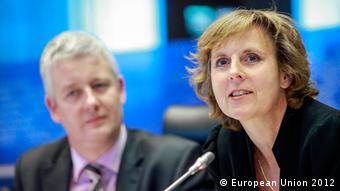The European Commission wanted to reverse a fall in prices for CO2 credits by artificially restricting their supply. But the European Parliament has rejected that proposal, leaving some energy companies upset.
The defeat in the European parliament on Tuesday (16.04.2013) over a reduction in the supply of emissions certificates came as a deep disappointment to SPD member Matthias Groote, who chairs the parliament's environment committee. The European Parliament has "taken on a destructive position," he said afterwards at a press conference, adding that the move unfortunately "fits with European patterns more generally."
During the debate on Monday evening, Groote supported the policy of artificially restricting the availability of emissions certificates and he believes the parliament will find little support internationally for its decision.
The certificates were introduced as a European instrument for climate protection so that it would cost something to produce damaging carbon emissions. Power plants, the auto industry and airlines, among others, were to pay for their emissions in the form of such certificates, generating an incentive for them to do something to reduce pollution. But while the commission initially expected a price of 30 euros ($40) per ton of CO2, the permits have recently been costing a tenth of that price. With the drop in price fell the incentive to innovate. Highly polluting coal-fired power plants are, for example, once again unbeatably cost effective.
Euro crisis breeds fear
EU climate commissioner Connie Hedegaard blames the economic and financial crisis for the fall in price. "The crisis has caused a fall in industrial production in the EU and thus the demand for allowances," she explained.
But in the end, many parliamentarians voted against the reform of the emissions trade system precisely because of the ongoing eurozone crisis. Italian European parliamentarian Amalia Sartori views the manufacturing sector as being in "a very serious crisis that is leading to a dramatic increase in unemployment and to the closure of factories." The situation makes "an additional tax untenable."
Herbert Reul, chair of the German Christian Democrat group within the European Parliament, also warns against weighing down industry with too many burdens and competitive disadvantages compared to other regions of the world.
Reul opposes artificial intervention in markets in general. "All market participants must be able to count on prices coming about by way of supply and demand," he says.
Incentives for green innovation?
But other members of Reul's party disagree. One of the most prominent is the group's spokesman on environmental issues, Peter Liese, who says that it's about more than establishing an incentive for environmentally-friendly decisions: when the price of certificates falls, state revenue also decreases. And that means there's less money for climate protection programs
Among the supporters of an artificial price increase for CO2 permit are some perhaps unexpected names, including some of Europe's largest energy companies like Shell, Eon and EDF. Green Party parliamentarian Bas Eickhout says, "They see that their innovation is being killed in Europe. They see that coal-fired power plants are now the cheapest option to buy energy."
Eon, for example, has a high number of gas power plants which are now barely able to turn a profit due to the boom in coal.
Reputation on the line
What's next following parliament's rejection? European climate commissioner Hedegaard fears that the vote endangers European climate policies as a whole. One could end up with "a patchwork of 27 different national regulations," she says.
After all, EU member states have shown very different levels of motivation when it comes to climate protection. The range runs from Denmark, which is pursuing a policy of completely renewable energy, to Poland, which wants to protect its many coal-fired power plants.
Hedegaard is also afraid that Europe could lose influence in international negotiations if the various EU countries were all doing something different.
However, the vote is not the end of the certificate system. The reform now gets sent back to the environment committee, but Hedegaard believes that it is really up to the member states to determine the fate of what she sees as the most important instrument in Europe's climate protection policies. dw de




No comments:
Post a Comment